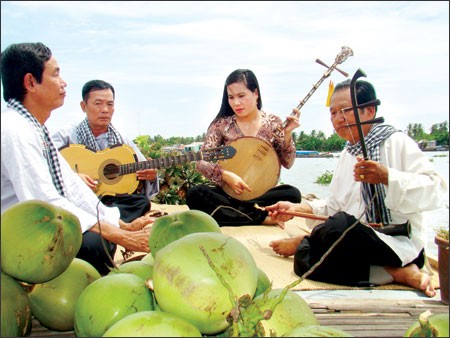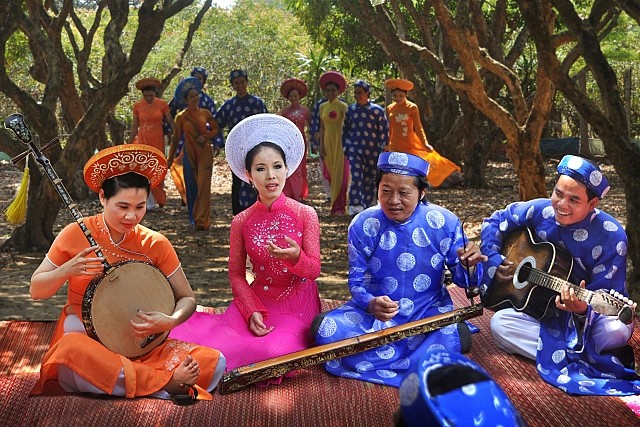(VOVworld) - Along with migrants from across Vietnam, “don ca tai tu” or amateur singing has been brought to Vietnam’s south-western sea together with other types of traditional art forms. Fishermen often sing “tai tu” songs to ease their tiredness after a long working day as well as their homesickness. For that reason, amateur singing clubs were established on Phu Quoc Island and warmly welcomed by the local inhabitants. VOV correspondent in the Mekong River Delta, Lam Hieu, reports as Vietnam received UNESCO certificate recognizing “don ca tai tu” or amateur singing as an intangible cultural heritage of humanity.
Over the past decade, Le Truong Giang’s house in Tho Chau commune of Phu Quoc island district has always been a rendezvous of people coming to perform and enjoy “don ca tai tu” or “amateur singing”. Members of the Tho Chau amateur singing club often gather here to practice their performances for the local residents. The club founder Le Truong Giang recalled his memories back in 1993 when he moved his family to the island: "At that time, we had nothing to entertain so I established this club to enrich the spiritual life of people living on the island. I’ve been passionate about amateur singing since I was small so this is the place where I can practice the art form with other fans of “don ca tai tu”. I feel very honoured as the art form was recognized as an intangible cultural heritage."
 |
Members of Tho Chau amateur singing club are fishermen, farmers, local officials, and even the elderly. They often gather to play music and sing for each other whenever they finish their work at times of rough sea. The sweet melodies of “don ca tai tu” help them to forget the hardship of their long trips at sea. Living on island, it was very difficult for the club members to get frequent updates on amateur songs in the past. Therefore, Giang used to compose new songs for the club. With simple yet meaningful verses, the songs feature the emotional life of the local people and encourage them to work hard for a better life. Although the islanders’ living conditions have improved significantly nowadays thanks to new modern forms of entertainment, the club still plays an inevitable part in their spiritual life. Nguyen Xuan Hien, club member said: "We have always had a passion for don ca tai tu. We support the efforts to preserve and develop the art form. Our passion is fully reflected in our performances at the club."
 |
The art form of amateur singing has not only contributed to enriching the local people’s spiritual life but also become a special feature to attract visitors to Phu Quoc island. The island has another amateur singing club which has around 30 members who often gather for practice 4 evenings a week at Phu Quoc district’s Children House and the Dinh Cau night market. Head of the club Ha Kim Thanh said: "Although we live far away from the mainland, the movement of amateur singing has developed strongly here. Many people are fond of this art form. In many of our performances, visitors and guests become the main singers in addition to the club singers."
70-year old Ha Kim Thanh is very passionate about “don ca tai tu”. Besides her regular work of making plans for the club and taking care of the members, Thanh composes songs and extracts for the members to practice. So far, she has composed more than 100 “tai tu” songs in praise of the local people and the beauty of Phu Quoc island. Many of her songs have been performed by the club members and received warm welcome from the audience.
Thanks to amateur singing clubs of Giang and Thanh, this art form, which was recognized as an Intangible Cultural Heirtage of humanity, has pervasively developed and preserved as part of efforts to protect the valuable cultural values of the southern people in particular, and of the Vietnamese people in general.